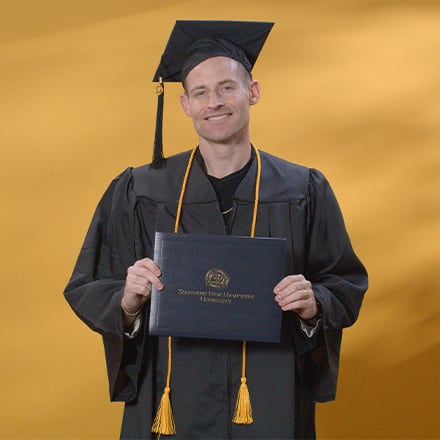What is a Health Sciences Degree?

Know before you read
At SNHU, we want to make sure you have the information you need to make decisions about your education and your future—no matter where you choose to go to school. That's why our informational articles may reference careers for which we do not offer academic programs, along with salary data for those careers. Cited projections do not guarantee actual salary or job growth.
A health sciences degree is interdisciplinary in nature, according to Dr. Meredith O’Hara, an associate dean of health professions at Southern New Hampshire University (SNHU). The program has pillars rooted in both the study of healthcare systems and the scientific elements of patient care.
“It is ideal for students seeking foundational knowledge in areas such as anatomy, physiology, healthcare operations and health management,” O'Hara said. But it can also appeal to those interested in the health promotions, policy and technology side of the profession, she noted — making it a program with wide appeal.
Whether you hope to improve the care you provide or positively impact the many other aspects of healthcare, a health sciences degree may help you stride closer to your goals.
What is the Point of a Health Sciences Degree?

A degree in health sciences allows you to explore a variety of topics to prepare you for entry into healthcare or bolster your qualifications when you’re ready to seek advancement, according to O’Hara.
In short: A health sciences degree is flexible.
“Overall, the degree supports a broad range of career and academic aspirations in the evolving healthcare landscape,” said O'Hara, who has devoted much of her career to higher education, including as a principal investigator on a National Science Foundation grant focused on introducing undergraduates to experiential learning early in their programs.
She also noted that learning outcomes can span multiple healthcare areas, with programs covering elements such as:
- Administration
- Health education
- Public health
The types of courses you can take will also vary.
What to Look For in a Health Sciences Program
Since health sciences degrees can differ, it’s important to research the schools that interest you and find a degree program that most aligns with your goals, O'Hara said.
Some schools also accept previously earned credits and can take work experience and certifications into account during the admission process. If you think you might have some credits or experiences that will qualify for college credit, be sure to apply to programs known to be transfer-friendly.

For instance, you can typically transfer an associate degree in allied health into SNHU's bachelor's in health sciences program. That can put you about halfway through earning a bachelor's degree.
You might also be on the lookout for programs with real-world applications. Dr. Brandon Ryans, DHEd, MHA, BS, CHES®, an associate dean of health professions at SNHU, said the university's bachelor’s in health sciences program emphasizes this, which helps prepare graduates to face today’s issues.
“This degree (can equip) students with a strong foundation in science, healthcare systems and critical thinking, which are essential for addressing complex health challenges,” he said.
Find Your Program
What Are Health Sciences Degree Jobs?
You can take a health sciences degree into virtually any area of the healthcare field — from patient care to business, programming and leadership. You can also use it as a stepping stone to a graduate degree.
According to Ryans, some health sciences degree jobs include:
- Health educator/coach: Promote wellness and healthy living strategies to individuals and groups
- Health informatics analyst: Manage and analyze data to improve patient care and system efficiency
- Healthcare administrator: Oversee healthcare facilities and operations and ensure compliance with regulations
- Medical/clinical laboratory technician: Assist in diagnostic testing and research
- Patient care coordinator: Connect patients to appropriate services and support
- Public health specialist: Work to improve community health through education, policy and preventive programs
O'Hara also noted that you could pursue the role of a health/science writer and primary or secondary teacher with the help of a health sciences degree. (Note: Licensure is a requirement for teaching in some states.)
Regardless of the career path you endeavor to follow, a health sciences degree can help you learn what you need to make a difference.
"For me, the value of this degree goes beyond career prospects. It’s about contributing to the well-being of individuals and communities,” said Ryans, who, in addition to his work in higher education, has held strategic roles in managed care and data analytics. “The healthcare industry is constantly evolving, and having a health sciences degree positions you to make a real impact.”
Read More: Examples of Jobs You Can Pursue With a Degree in Health Science
What is an Allied Health Degree?
If you’re interested in the health sciences, you may have heard the term “allied health degree.” Similar to a health sciences degree, an allied health degree concentrates on the knowledge and skills that are helpful to careers in healthcare.
The difference is that an allied health degree is focused primarily on patient care, while a health sciences degree is broader, exploring both science and functionality, Ryans said.
According to allied health articles in ScienceDirect, an allied health professional is a nonphysician health professional. Some allied health careers ScienceDirect noted include:
- Dental hygienist
- Diagnostic medical sonographer
- Dietician
- Occupational therapist
- Speech-language pathologist
(Note: SNHU does not currently offer degrees in dental hygiene, sonography, dietetics, occupational therapy or speech-language pathology).

From Allied Health Experience to a Bachelor's Degree
If you already have experience in an allied health role, earning a bachelor’s degree can help you become a well-rounded health professional, according to Ryans. It allows you to mix your technical expertise with the skills needed for administration and leadership, he said.
“This progression helps enhance career opportunities and earning potential,” Ryans said.*
Between 2023 and 2033, the U.S. Bureau of Labor Statistics (BLS) expects the number of entry-level jobs at the bachelor's degree level to grow by 7.2% and have the largest quantity of job additions throughout the decade than any other education level.*
BLS also reported that bachelor's degree holders earned a median of 39% more per year than those at the associate degree level.
Because an allied health associate degree can offer you a lot of practical experience in the field, Ryans said, you may be able to pull from that to better understand the complex aspects of a health sciences bachelor's degree.
“The associate degree equips students with hands-on skills and practical knowledge in a specific healthcare field, which can be valuable when transitioning to a broader degree,” he said.
And with flexible online degree options, you don't have to put aside your career to advance your education.

As a surgical technologist in the U.S. Army, Ryan Leite '24 was on a nursing track when he decided to transfer schools. He chose to study health sciences online at SNHU.
“With all my military credits and everything, they were super helpful and were able to allow me to enroll in that program with all my experience and all the classes I had already taken," he said.
When it came time to graduate, Leite traveled from Washington to New Hampshire to attend his Commencement ceremony. Between the nursing prerequisites he already had and his bachelor's degree from SNHU, Leite said he felt he had options as his military service ended.
His first stop? An internship with a medical device company and the knowledge that he has the educational qualifications to pursue a sales representative role in his field while knowing he could always return to his interest in nursing if he wanted to.
“Anybody at home who’s, like, thinking about ‘Can I do it?’ or ‘Should I do it?’ ... It’s doable," Leite said about his degree. The consistency of a set schedule, he said, term after term helped him stay motivated and create a routine he could stick with.
So, Is Health Sciences a Hard Major?
While what makes a degree challenging can depend on the individual, O’Hara said the range of required courses can be tricky for some.
"Balancing subjects like anatomy, reimbursement and healthcare policy can feel overwhelming, especially when the material is highly detailed or technical,” she said.
While challenging, the interdisciplinary aspect is necessary to build foundations for success in the field, according to Ryans. He said that, in today's landscape, healthcare leaders need to understand topics such as:
- Health equity
- Cultural competency
- Social determinants of health
Don't worry, though. There are methods for navigating broader studies. “I recommend that students approach these challenges by staying organized and managing their time effectively, breaking larger tasks into smaller, manageable steps,” O’Hara said.
And if you could use extra support, you don’t have to look too hard at some schools. At SNHU, for instance, Ryans said you can find a community of support, faculty and resources that are aimed at helping you academically and in your career.
*Cited job growth projections may not reflect local and/or short-term economic or job conditions and do not guarantee actual job growth. Actual salaries and/or earning potential may be the result of a combination of factors including, but not limited to: years of experience, industry of employment, geographic location, and worker skill.
Rebecca LeBoeuf Blanchette '18 '22G is a writer at Southern New Hampshire University, where she fulfills her love of learning daily through conversations with professionals across a range of fields. She earned her Bachelor of Arts in Communication with a minor in Professional Writing from SNHU’s campus in Manchester, New Hampshire, and followed her love of storytelling into the online Master of Arts in English and Creative Writing at SNHU. Connect with her on LinkedIn.
Explore more content like this article

The Importance of Health Education

SNHU Spotlight: Philip Hensarling, BS in Healthcare Administration Grad

SNHU Spotlight: AnnMarie Kulis, MS in Healthcare Administration Grad
About Southern New Hampshire University

SNHU is a nonprofit, accredited university with a mission to make high-quality education more accessible and affordable for everyone.
Founded in 1932, and online since 1995, we’ve helped countless students reach their goals with flexible, career-focused programs. Our 300-acre campus in Manchester, NH is home to over 3,000 students, and we serve over 135,000 students online. Visit our about SNHU page to learn more about our mission, accreditations, leadership team, national recognitions and awards.

